|
|
|
Sort Order |
|
|
|
Items / Page
|
|
|
|
|
|
|
| Srl | Item |
| 1 |
ID:
128223
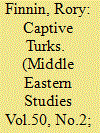

|
|
|
|
|
| Publication |
2014.
|
| Summary/Abstract |
It has become accepted that, during the Soviet period, Turkey 'ignored the plight' of the Crimean Tatars, who were brutally deported to Central Asia by Stalin in 1944. This narrative of Turkish indifference with respect to the Crimean Tatar 'question' overlooks a corpus of material that tells something of a different story. This corpus is literary. The Crimean Tatars figured centrally in Pan-Turkist poems and pulp fiction novels as protagonists whose victimization by the Communist regime was represented in order to provoke outrage and action, not silence and passivity. These literary texts seek to elicit in the reader what can be called ' irredentist solidarity , a convergence of fellow-feeling that involves a total identification of the Other as the same.
|
|
|
|
|
|
|
|
|
|
|
|
|
|
|
|
| 2 |
ID:
128225
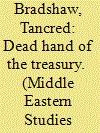

|
|
|
|
|
| Publication |
2014.
|
| Summary/Abstract |
This paper addresses an aspect of British policy in the Trucial States that has received scant scholarly attention. It examines British attempts to promote economic and social development in the Trucial States, and places this policy within the context of British attitudes towards the economic development of the colonial empire. During the 1950s Britain's interest in the Arabian Peninsula expanded, in notable contrast with the rest of the Middle East. One aspect of this expanded role was British efforts to improve the economic and social conditions prior to the discovery of oil in Abu Dhabi in 1958. British officials on the ground were concerned to improve the lot of the population of these impoverished shaikhdoms for a combination of political and strategic and ethical reasons. This article shows that attempts to introduce a modicum of economic and social development in the Trucial States were hindered by the Treasury's refusal to provide adequate funds, and because of inherent problems in finding suitable development projects. Nonetheless, the plans put in place during the 1950s did provide the foundations for subsequent development programmes, which, in turn, drastically expanded as a result of oil wealth.
|
|
|
|
|
|
|
|
|
|
|
|
|
|
|
|
| 3 |
ID:
128220
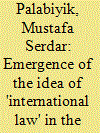

|
|
|
|
|
| Publication |
2014.
|
| Summary/Abstract |
The literature on the Ottoman Empire's position in the European states system generally considers the Treaty of Paris as a landmark event for the European states' recognition of the Ottoman participation in the European concert and the advantages of European international law. This article argues that this consideration overestimates the impact of the Treaty of Paris and reveals that before 1856, the Ottoman Empire was a part of the European states system and was subject to European international law both in terms of treaty-making practices and in the utilization of European customary law. Moreover, the article argues that the Ottomans were interested in the concept of international law before the Treaty of Paris. The existence of archival documents on Ottoman dealings with the European states and the publication of two translations from the European international law treatises before the Treaty of Paris indicate that the Ottomans interest in international law was to ensure the survival of the empire.
|
|
|
|
|
|
|
|
|
|
|
|
|
|
|
|
| 4 |
ID:
128222
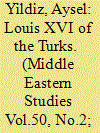

|
|
|
|
|
| Publication |
2014.
|
| Summary/Abstract |
Selim III ruled the Ottoman Empire in the Age of Revolutions, but his rule did not reflect the vigorous, expansionist and aggressive spirit of this age. He more resembled a ruler forced to defend his empire from the turbulence of the age, an effort which also shaped his character and perception of rulership. During his years in royal confinement, he clung passionately to the revival of the warrior-sultan through charismatic leadership. While on the throne, there was a gradual transformation of his perception of rulership and he became satisfied with being the bureaucratic ruler of the empire.
|
|
|
|
|
|
|
|
|
|
|
|
|
|
|
|
| 5 |
ID:
128224
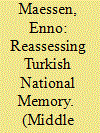

|
|
|
|
|
| Publication |
2014.
|
| Summary/Abstract |
In this article continuity and discontinuity of interpretations and manipulations of national memory during the successive governments of the Adalet ve Kalk?nma Partisi (Justice and Development Party - AKP) in Turkey are investigated. The strong continuities between the Islamist parties of the 1990s and the AKP, with regard to the way they consider and manipulate Ottoman history as a means of political legitimation, are demonstrated. In addition, the continuity between the AKP's style of governance and that of preceding governments is shown. The conclusion of the article is that, in addition to continuities with its Islamist predecessors, the AKP is to a large extent still embedded within the boundaries of the nationalist framework set out by Kemalism with regard to the party's stance on Turkish citizenship, national identity, traumas in national history and leader-centred politics.
|
|
|
|
|
|
|
|
|
|
|
|
|
|
|
|
| 6 |
ID:
128217
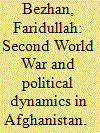

|
|
|
|
|
| Publication |
2014.
|
| Summary/Abstract |
This paper explores how the Second World War brought a new breadth to Afghanistani politics despite the fact that the country did not participate in the war. It widened the power struggle between members of the royal family and introduced new players to the scene who, by fighting for their own interests, shaped the course of events. The paper looks at the main political issues which caused division within the ruling class, mobilized the educated classes, and shaped Afghanistani politics. It also examines those players who brought about the new political developments.
|
|
|
|
|
|
|
|
|
|
|
|
|
|
|
|
| 7 |
ID:
128218
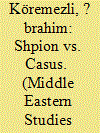

|
|
|
|
|
| Publication |
2014.
|
| Summary/Abstract |
In October 1853, a war erupted between the Russian and the Ottoman empires, which became the celebrated Crimean War in the following year. The Danubian theatre, one of the crucial scenes of the war, witnessed both belligerents trying to discover the other's activities and planned operations. As they were inhabited by cosmopolitan and heterogeneous populations, Dobruca (Dobruja) and Bessarabia were the most convenient places for both parties to gather military intelligence. The Ottomans acquired information via the Wallachians and the Cossacks, as well as by diplomatic missions and various merchants. The Ottoman Empire's Orthodox Christian subjects - the Bulgarians and Greeks - assisted Russia in gathering information from the right bank of the Danube. Some of these reports were unreliable, as were the spies themselves. The Russian and Ottoman archives have rich resources related to military intelligence, which is an understudied aspect of the Crimean War. Relying upon the archival sources, this paper aims to discuss an entirely ignored topic: the espionage activities in the Balkan theatre during the Crimean War.
|
|
|
|
|
|
|
|
|
|
|
|
|
|
|
|
| 8 |
ID:
128221
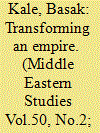

|
|
|
|
|
| Publication |
2014.
|
| Summary/Abstract |
The Ottoman Empire's immigration and settlement policies were redefined in the nineteenth and early twentieth centuries as a result of the population movements caused by the rise of nationalism, wars and territorial losses. With changing demographics and the acceptance of a new citizenship concept by the Tanzimat Edict in 1839, the millet system which had previously secured the multi-ethnic and multi-religious nature of the empire for centuries was challenged. The central argument of the paper is that the Ottoman state responded to these challenges by supporting a liberal migration and settlement policy in an institutionalized and highly complex structure through the pioneering Ottoman Migration Commission. Although certain restrictions later took place due to internal and external factors such as a changing economic, social and political climate, the institutionalized settlement and migration policy proves that a multi-dimensional system was developed in response to the challenges of a dissolving and yet transforming Empire.
|
|
|
|
|
|
|
|
|
|
|
|
|
|
|
|
| 9 |
ID:
128219
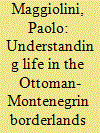

|
|
|
|
|
| Publication |
2014.
|
| Summary/Abstract |
The paper reconsiders the development of decentralization/centralization dynamics during the Ottoman Empire, focusing on the Ottoman-Montenegrin borderlands of Northern Albania with particular reference to the Mirdite territory inhabited by Catholic tribes. First, the paper describes the local socio-political system and balance of power in Mirdite territory before the enactment of the Gulhane decree. Secondly, the paper focuses on the developments and changes occurring in this land during the Tanzimat. Interaction, intertwining and overlapping between different strategies and policies are analysed in regard to the relationship between Catholic tribes, missionaries and Ottoman officials. Because of them, the changes and developments in the local administrative system occurring in both the religious and the political dimensions during the last part of the nineteenth century were expressions of the process of decentralization/centralization triggered by Istanbul from the third decade of the nineteenth century on.
|
|
|
|
|
|
|
|
|
|
|
|
|
|
|
|
|
|
|
|
|